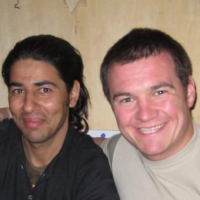Afghan Interpreters Who Helped U.S. Troops Face Visa Denials
 Afghan interpreter Mohammad Janis Shinwari with U.S. Army Capt. Matt Zeller (photo: Mohammad Janis Shinwari)
Afghan interpreter Mohammad Janis Shinwari with U.S. Army Capt. Matt Zeller (photo: Mohammad Janis Shinwari)
The Obama administration has denied numerous Afghan interpreters entry into the United States, even though they helped the U.S. military and now face death threats from the Taliban.
With American troops planning to pull out next year, the interpreters say insurgents intend to kill them and their families for supporting the U.S. occupation. But the State Department has repeatedly rejected the visa applications of these men, saying there is no serious threat against them.
The interpreters beg to differ.
“There are tons of Talibs in my village, and they all know that I worked with the Americans,” one interpreter, Mohammad, who asked that his last name not be published for security reasons, told The Washington Post after being denied a visa. “If I can’t go to the States, my life is over. I swear to God, one day the Taliban will catch me.”
A spokesman for the U.S. Embassy in Kabul, Robert Hilton, refused to explain to the newspaper what constituted a “serious threat.”
Some members of Congress want to help the Afghan interpreters.
“There’s no excuse for thousands of people who have helped our troops being stranded there with their lives endangered,” Representative Jim Moran (D-Virginia) told Army Times. “We really have a moral responsibility here to move this, and the consequences likely to befall the people who need those visas we don’t want to contemplate.”
Another interpreter whose visa application was rejected told the Post he had worked for years at a U.S. military prison screening visitors, which made him well known to the families of detained militants. If he can’t leave the country, he fears something terrible will happen to him.
Naseri, a third interpreter who spent five years assisting U.S. troops, hasn’t been able to get a visa. He survived three attacks on the American military units he accompanied. Naseri says he’s been called a “spy and a traitor,” and that his family has received death threats, which is why he wants to relocate to the U.S.
A Special Immigrant Visa (SIV) program was established by Congress four years ago, allocating a maximum 8,750 visas for Afghans and Iraqis who aided the U.S. military. Of those, 1,648 interpreters have received the SIVs.
The program has been plagued by delays and other problems, and the State Department has been criticized for various vague and unexplained visa revocations.
-Noel Brinkerhoff
To Learn More:
In Afghanistan, Interpreters Who Helped U.S. in War Denied Visas; U.S. Says They Face No Threat (by Kevin Sieff, Washington Post)
Advocates: U.S. Has 'Moral Responsibility' To Fix Interpreter Visa Blunder (by Joe Gould, Army Times)
An Afghan Interpreter Seeks a Visa That Is Unlikely to Come (by Rucker Hunt Culpepper, New York Times)
Unearthed Corpse of Afghan Torture Victim Ignites Controversy over American Involvement (by Noel Brinkerhoff, AllGov)
- Top Stories
- Unusual News
- Where is the Money Going?
- Controversies
- U.S. and the World
- Appointments and Resignations
- Latest News
- Trump to Stop Deportations If…
- Trump Denounces World Series
- What If China Invaded the United States?
- Donald Trump Has a Mental Health Problem and It Has a Name
- Trump Goes on Renaming Frenzy






Comments